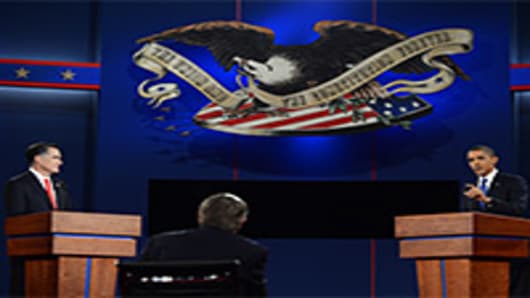The debate made it official: rich is a four-letter word in this election. It’s not just that both candidates want to be seen as champions of the middle class. They also want to be seen as enemies of the upper class, or at least not friendly toward them.
Who can blame them? No one should feel bad for the rich right now. And supporting the middle class is like being for puppies and children and family. Everyone’s for it.
Yet last night highlighted just how far populism has come in this campaign.
It all started with The Donald. As the debate turned to taxing top earners, Obama said high earners are millionaires and billionaires, while Romney argued that many of those high earners are job-creating small businesses. (Read more: Affluent Plan to Spend Less If Obama Wins)
“Under Romney's definition,” Obama said, “there are a whole bunch of millionaires and billionaires who are small businesses. Donald Trump is a small business. Now, I know Donald Trump doesn't like to think of himself as small anything, but — but that's how you define small businesses if you're getting business income.”
Romney didn’t exactly rally for the cause of Trump. He argued that by targeting the Trumps of the world, Obama would hit small businesses instead.
“The reality is it's not just wealthy people — you mentioned Donald Trump. It's not just Donald Trump you're taxing. It's all those businesses that employ one-quarter of the workers in America, these small businesses that are taxed as individuals.”
Trump told CNBC in a statement, “It’s a great honor to be representing free enterprise in this country as a tremendous job creator. I greatly appreciate being mentioned by the president and Governor Romney in such an important event.”
Clear, all publicity is good publicity for the Donald.
But private-jet fliers got even less love last night. Obama repeated a longtime policy aim of stripping jet owners of tax incentives.
“Why wouldn't we eliminate tax breaks for corporate jets?” he asked. “My attitude is, if you've got a corporate jet, you can probably afford to pay full freight, not get a special break for it.”
Once again, Romney failed to rise up in defense of the private-jet set. But the National Business Aviation Association did.
Before the debate had ended, the NBAA — the advocates for private jets — issued the following statement:
The president's comments completely mischaracterized the businesses and groups that depend on an airplane, the majority of which are small- to mid-sized businesses, farms, flight schools, medical care providers and emergency responders that use the aircraft to connect communities and grow their businesses.
Take that Obama. When you’re trash-talking private-jet owners, you’re really just hurting farmers.
Finally, on the subject of taxes, neither Obama nor Romney wanted to be seen as wealth-friendly, even though the top 1 percent of taxpayers pay more than 30 percent of the nation’s taxes.
Obama wants to raise taxes on high earners and says Romney wants to lower them. Romney last night vowed not lower taxes on high earners, even though many in the GOP want to “broaden the base” and reduce the share of taxes paid by the top.
“I cannot reduce the burden paid by high-income Americans. So any — any language to the contrary is simply not accurate,” Romney said.
Romney also said the wealthy still wealthy, and they’re going to stay wealthy no matter who takes over the White House. This stands in stark contrast to the argument from many in the GOP that the 1 percent are job creators who need more encouragement, lower taxes and less uncertainty in their lives so that they can invest and hire.
“High-income people are doing just fine in this economy,” Romney said. “They'll do fine whether you're president or I am.” (Read more: Romney Leads Among Wealthy Women)
There are a lot of wealthy voters and financial backers, however, who beg to differ.


